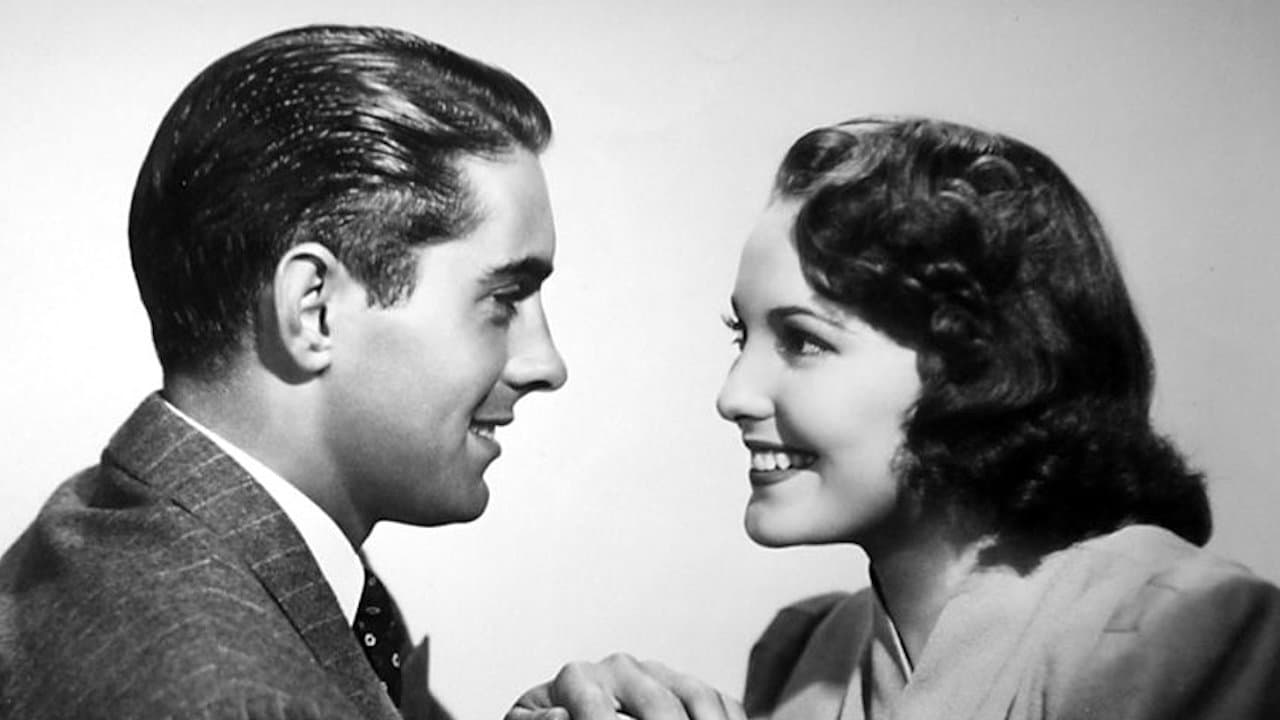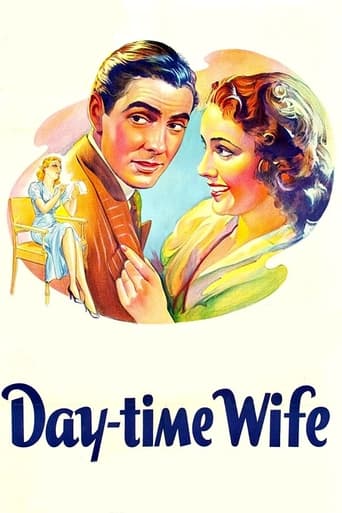ManiakJiggy
This is How Movies Should Be Made
Humaira Grant
It’s not bad or unwatchable but despite the amplitude of the spectacle, the end result is underwhelming.
Aneesa Wardle
The story, direction, characters, and writing/dialogue is akin to taking a tranquilizer shot to the neck, but everything else was so well done.
Frances Chung
Through painfully honest and emotional moments, the movie becomes irresistibly relatable
istara
Day-Time Wife is an absolute gem of a film that is easily enjoyable for its own sake, not merely as a vintage curiosity.Linda Darnell is sparkling as the young, neglected wife and Tyrone Power very watchable as the handsome but wandering husband.The scene in which the two secretaries and their bosses end up at the same restaurant, where Darnell more than gets her revenge on her excruciated husband, is exquisite.The ending also manages to be truly sweet and happy in a plausible way. He's been a fool, but not a total fool.The only implausibility, perhaps, is the notion of a man neglecting a young wife as beautiful and vivacious as Darnell for his significantly older, less pretty and less amusing secretary. Not that Wendy Barrie isn't a beauty in her own right, but she's eclipsed from every angle by Darnell.Definitely give this one a watch: it's hugely funny, with a plot that's strong enough to merit a modern remake. This would also be excellent as a play.
megschrist
This movie was not bad, it wasn't wonderful but it wasn't bad. There were some very funny scenes. I found it fascinating (and slightly disturbing) that Linda Darnell was only 16 when she made this movie! She did a very good job in this role considering her age!The movie starts on the morning of Mr and Mrs Norton's second anniversary. Ken Norton doesn't realize what day it is and that night while an anniversary party is taking place at their house his secretary calls in to let Jane know he's got to work late. The guests decide to bring the party to him. When they get to his office they find two cleaning ladies but no Ken and no secretary. Jane's friend finds a bottle of expensive perfume in the secretary's drawer. Ken sneaks into their apartment late at night while Jane is still awake and smells the expensive perfume on her husband.Jane sets out to find what a secretary/boss relationship is like and gets a job with a well off architect. Things get interesting when Jane's boss and Ken start working on a contract and arrange a double date with their secretaries to discuss the contract.
MartinHafer
This comedy is a watchable time-passer and nothing more. It's really amazing, as Tyrone Power was a hugely popular actor at the time and 1939 is known to cinema historians as probably the best year for Hollywood films ever. Well, to every rule, there must be exceptions. Now I am not saying this is a bad film, but it certainly isn't particularly good thanks to a rather poor script. Also, while I think one of the reviewers was a tad too harsh on Power, I do agree that Cary Grant could have probably made this film work a bit better--Tyrone just isn't a great actor in this style of film.DAY-TIME WIFE begins with Linda Darnell and Power as husband and wife. By the way their apartment looks, Power's job must make him a ton of money and you'd think they would be wildly happy (I know I would have if I was married to Darnell!). However, Power is not a particularly good husband and appears to be cheating on her. Now here's where it gets weird. Darnell is positive that he's lying about working late nights and there is every reason to assume that he's cheating. So what does she do? She gets a job as a secretary and investigates what lecherous bosses want from their comely employees. In other words, after getting a job with a real heel (Warren William in a role rather typical for him), she'll learn the tricks secretaries know to attract men. Why secretaries are suddenly experts, why Darnell is so forgiving of Power and why she goes to so much trouble just doesn't make sense. She is a lousy role model for women, that's for sure!! Later in the film, it turns out that Darnell's boss and Power have a working relationship and this is bad because she doesn't want her husband to know that she's working. So, there are a few kooky times they almost meet in the work place and ultimately they do meet--when she goes out with William for a night on the town as well as some hanky-panky....and Power and his secretary come along for the fun.Overall, a silly and rather sleazy plot that makes little sense but somehow works due to the usual 20th Century-Fox polish and decent acting from Darnell and William. As for Power, this is a sad episode and was fortunately soon forgotten. He was just so much better in dramas or swashbucklers than in this sort of silly fluff. His next film, JOHNNY APOLLO, was a dandy film and thankfully he was soon back to form.
David (Handlinghandel)
A light-as-air confection, with very dark overtones. The very young, fresh-faced Linda Darnell is stood up on their second anniversary by husband Tyrone Power. The always delightful Binnie Barnes, her poisonous often-divorced friend Blanche says he's fooling around. Darnell refuses to believe it.But believe it she must as evidence piles up. So, under the guide of shopping all day, she takes a job as a secretary. Her goal: finding out what about their secretaries appeals to men. (It must be noted that a husband willing to accept five-day-a-week, all-day shopping expeditions goes against many conventions.) Ushered in by goofy but knowing receptionist Joan David -- THE Joan Davis, that divine comedienne here in an early, rather small role -- she interviews for a job. Her boss is Warren William, at his slimiest. He comes on to her like nobody's business, his own wife notwithstanding.Darnell is determined to keep working rather than depend on Power's money and to pursue her plan: What makes these guys fall for these girls? William and Power are business associates and they all, secretaries and his wife included, end up at a nightclub. She is very firm with Power but in the end makes up with him.It's an early feminist movie. And in its own gentle way it's a subversive one, too. Unlike Catherine Deneuve in "Belle de jour," she does not become a call girl. But she scandalizes her chauvinistic, narrow-minded husband by becoming a working woman -- and a very smart one at that.

